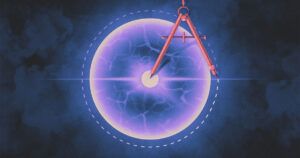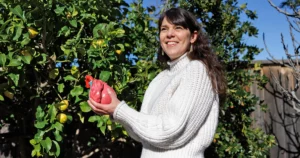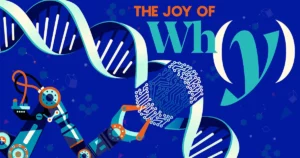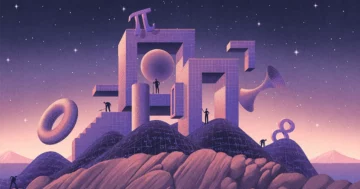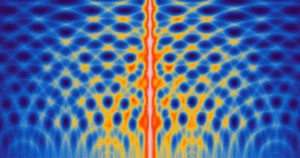
Introduction
I have a confession: When I was 4, I was kicked out of ballet class for asking too many questions. I asked why a lot, like any kid. And I guess the teacher didn’t appreciate it. Luckily for me, the mathematician Steven Strogatz and the team at Quanta Magazine like to ask questions too. It’s the driving force behind our science podcast The Joy of Why, which kicks off its second season today.
Our first season covered topics as diverse as sleep, mathematical knots, aging and quantum gravity. I came into this season excited to ask new questions and to learn something unexpected along the way. Imagine my surprise a few weeks ago when Steve and Quanta editor-in-chief Thomas Lin started talking about different sizes of infinity. That stopped me in my tracks. What a joy to have my assumptions about infinity turned upside down. And what a joy for me to ponder David Hilbert’s famous paradox about a hotel that is always booked solid, yet always has room for more guests. This was all in preparation for an episode about infinity with the set theorist Justin Moore.
“Joy” is very much the operative word when it comes to this podcast. We laughed out loud when the mathematician Eugenia Cheng went on a tangent in her episode on category theory. To illustrate how it can apply broadly as a way of thinking beyond mathematics and physics, she mentioned how she finds herself using category theory to describe the way she interacts with people. She said she remembers the roles people play in her life, in context, better than she remembers how people look. Then she shared how several exchanges she described as “obnoxious” all contained a certain brand of obnoxiousness. Looking back at her emails, Cheng realized the exchanges were all with the same person. She hadn’t remembered the person, but she had placed their behavior in a category!
Introduction
Here’s a second confession: My math education didn’t go well, and let’s just say I wasn’t hanging out reading Steve’s classic book Nonlinear Dynamics and Chaos on a Friday night. But I’m a changed person because of our work together. Steve is kind and unassuming, and he’s a great educator, too. He’s the type of person who, instead of trying to show you how smart he is, just loves to learn for learning’s sake. It shows in the way he talks with guests. He wants everyone to get in the same rocket ship, strap on their seat belts, and ask lots of questions together.
One voyage of discovery reminded me how much I love to watch jellyfish pulse dreamily through the water. But who knew that jellyfish propulsion can teach us about submarine design? Or that reading jellyfish vortex rings can help us detect heart failure? Exploring the world of fluid dynamics with John Dabiri of the California Institute of Technology is an eye-opening tour of just how much we can learn from nature.
And, spoiler alert, not every episode has a happy ending. Our co-producer Susan Valot brought Steve and the theoretical cosmologist Katie Mack together to unpack the different scenarios for how the universe could end. The possibilities sound like Hollywood thrillers. There’s “heat death,” aka the Big Freeze, which involves dark matter, maximum entropy and the sun boiling the oceans off the Earth. Yikes. Then there’s the Big Rip, where the universe stretches apart faster and faster, ultimately tearing everything up. And then there’s “vacuum decay.” You’ll have to listen to the first episode of the season to hear Mack describe that one. Don’t worry, she says our universe could surprise us by expanding and contracting forever. And even if the universe does end, it won’t be for billions of years. So we have time to produce more episodes.
In the meantime, we invite you to listen to Steve Strogatz in conversation with some of the brightest minds in science and math today as they ask the big questions and share what they know — and what they don’t. All of us at The Joy of Why hope you’ll enjoy the new season. The podcast is available on Apple Podcasts, Spotify, Stitcher, Google Podcasts, or your favorite podcasting app, or you can stream it from Quanta. New episodes drop every other Thursday, starting February 23.
- SEO Powered Content & PR Distribution. Get Amplified Today.
- Platoblockchain. Web3 Metaverse Intelligence. Knowledge Amplified. Access Here.
- Source: https://www.quantamagazine.org/the-joy-of-asking-about-infinity-jellyfish-and-the-end-of-the-universe-20230209/
- a
- About
- Alert
- All
- always
- and
- apart
- app
- Apple
- Apply
- appreciate
- available
- back
- because
- behind
- Better
- Beyond
- Big
- billions
- blogs
- book
- brand
- broadly
- brought
- california
- Category
- certain
- Cheng
- class
- classic
- context
- contracting
- Conversation
- could
- covered
- Dark
- Dark matter
- David
- Death
- describe
- described
- Design
- different
- discovery
- diverse
- Dont
- down
- driving
- Drop
- dynamics
- earth
- editor-in-chief
- Education
- emails
- enjoy
- Episodes
- Even
- Every
- everyone
- everything
- Exchanges
- excited
- expanding
- Exploring
- faster
- Favorite
- February
- few
- finds
- First
- Fluid dynamics
- Force
- forever
- Freeze
- Friday
- from
- get
- Go
- great
- guests
- happy
- help
- Hollywood
- hope
- hotel
- How
- HTTPS
- in
- Infinity
- instead
- Institute
- interacts
- invite
- IT
- John
- Justin
- Kicks
- Kid
- Kind
- Know
- LEARN
- Life
- Look
- looking
- Lot
- love
- many
- math
- mathematics
- Matter
- maximum
- meantime
- mentioned
- minds
- more
- Nature
- New
- night
- oceans
- ONE
- Other
- People
- person
- Physics
- plato
- Plato Data Intelligence
- PlatoData
- Play
- podcast
- Podcasting
- ponder
- possibilities
- produce
- propulsion
- pulse
- Quantamagazine
- Questions
- Reading
- realized
- rocket
- roles
- Room
- Said
- sake
- same
- says
- scenarios
- Science
- Season
- Second
- set
- several
- Share
- shared
- show
- Shows
- sizes
- smart
- So
- solid
- some
- something
- Sound
- Spotify
- started
- Starting
- Steve
- stopped
- Sun
- surprise
- Susan
- talking
- Talks
- teacher
- team
- Technology
- The
- the world
- their
- theoretical
- Thinking
- Through
- time
- to
- today
- together
- too
- Topics
- Tour
- Turned
- Ultimately
- Unexpected
- Universe
- Upside
- us
- Voyage
- Watch
- Water
- webp
- Weeks
- What
- which
- WHO
- Word
- Work
- work together
- world
- years
- Your
- zephyrnet





